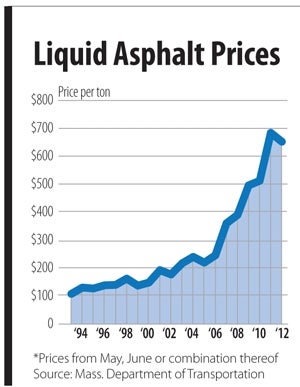Oil prices don’t only impact the price you pay at the pump. They make the roads you drive on more expensive to pave.
Liquid asphalt, which contains petroleum, has nearly tripled in price in the past decade, according to Massachusetts figures. Add to that rising labor costs and state funding challenges and the result is fewer miles of roadway resurfaced each year.
That’s a financial problem. Here’s an environmental problem: Thousands of tons of old tires and roofing shingles are discarded each year in Massachusetts, partly because there isn’t a recycling market big enough to handle them.
There could be a single solution to those two problems: mix the used materials into asphalt.
Not only would it be environmentally friendly, said Walaa Mogawer, a UMass Dartmouth professor who has been testing recycled asphalt mixes for past seven years. It would save money and result in equal or better surface quality, he said.
In addition, it could create blue-collar jobs, according to a state lawmaker who is advocating for the change.
“My dream is to see it going in at 50 percent recycled materials,” said Mogawer, who heads the school’s Highway Sustainability Research Center.
That kind of ratio isn’t going to happen yet. The state has moved forward cautiously, even with just plain old recycled asphalt pavement (no tires or shingles included). The Massachusetts Department of Transportation (MassDOT) has capped recycled asphalt, or RAP, at 15 percent of the total mix. But the number is slowly rising. It was 10 percent in 2010.
“If we were to use something with faulty materials, or if it were to fail or not live up to engineers’ expectations and what drivers’ expect, clearly we would have somewhat of a problem,” said Michael Verseckes, a MassDOT spokesman.
There are tires that have been recycled into asphalt on many main Massachusetts roads, according to Verseckes, including Route 146 and Interstate 290. Thus far, the ground-rubber tire mixes have been used as a preservation treatment responsible for the recycling of nearly one million tires in the state.
Mogawer is bullish about the potential for the materials in the state.
“The lab data show good results,” he said.
And the development of methods to roll asphalt at cooler temperatures, called “warm mix,” has furthered the rubber asphalt cause. Massachusetts was the first state to use the mix on its highways, starting in 2005.
Using the high temperature that asphalt paving used to require — about 350 degrees Fahrenheit — rubber would get too sticky, making it difficult to use.
But a difference of just 50 degrees makes it easier to work with, and it also reduces odors and greenhouse emissions, Mogawer said. MassDOT plans to require all its paving jobs to use warm mix next year, according to its website.
But Mogawer said one problem that can come up with recycled materials, particularly roofing shingles, is they have been exposed to the sun and get oxidized and stiff, making them difficult to work with in asphalt mixes.
Accurate testing is especially important for high-speed, high-volume roads like state highways, Mogawer said, but he would like to see cities and towns try it out on their lower-volume roads.
Sen. James Eldridge, D-Acton, would like to see recyclable materials on state and local roads.
“I would like to see the state move more aggressively,” Eldridge said. “We’re looking to get it to the norm.”
Job Creator?
Eldridge said the blue-collar jobs that could be created in the rubber and shingle recycling industry excite him because the highest rates of unemployment are in blue-collar industries.
Eldridge said he has not personally heard any pushback from paving contractors, but said he understands they could make less money if more recycled materials were used in their products. Several area paving contractors did not return calls for comment.
If there are companies that oppose the measure for financial reasons, there are also plenty in favor.
Eldridge and the MetroWest Chamber of Commerce hosted a forum this month in Fitchburg with several area companies that would benefit from a state requirement that contractors use a recycled asphalt mix.
Among them was Rooftop Recycling in Boxborough, which, as its name suggests, recycles roofing shingles.
“There are probably 10 to 15 states using shingles in their roads,” owner Sean Anestis said. “I struggle to find outlets for the shingles.”
But that would all change if MassDOT were to alter its asphalt specifications to require that shingles be an ingredient.
A new MassDOT spec, even for just 5-percent shingles used in roads, would have a huge impact on the amount of shingles recycled in the state, Anestis said.
But he urges the industry to proceed with caution, saying a waste ban on shingles right now would be premature and irresponsible.
“Nobody’s promoting that we just throw this in and see what happens,” he said. “If a road fails because of recycled products, we’ll never get recycled products considered.”

